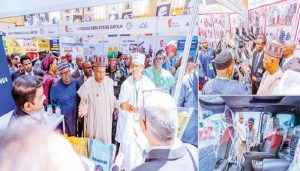 In a move to bolster the country’s manufacturing sector, Vice President Kashim Shettima has called for increased prioritization of local content and promotion of Nigerian-made products.
In a move to bolster the country’s manufacturing sector, Vice President Kashim Shettima has called for increased prioritization of local content and promotion of Nigerian-made products.
Addressing the National Manufacturing Policy Summit on Monday, Shettima affirmed that Executive Order 003, which mandates the patronage of locally manufactured goods by government ministries, departments and agencies, remains in effect.
Shettima revealed that the Federal Government has partnered with the Manufacturers Association of Nigeria (MAN) to devise an actionable roadmap and policy framework aimed at revitalizing the nation’s manufacturing capabilities. He stressed the need to expand Nigeria’s production base, prioritize local content, and boost the competitiveness of made-in-Nigeria goods.
“We cannot achieve significant progress in our drive for industrialization unless we deliberately promote the production of capital goods. We must be focused on expanding our production base, prioritizing local content, and promoting made-in-Nigeria products,” Shettima stated.
The VP further noted that Africa has long languished at the bottom of the global value chain, with its share of global manufacturing accounting for less than two percent. He expressed confidence in Nigeria’s industrial capabilities, creativity and innovation, as evidenced by his tour of the summit’s exhibition.
Shettima outlined five key pillars of the summit, which he described as a clear roadmap for stimulating the manufacturing sector. These include upscaling productivity and competitiveness, ensuring energy security and infrastructure development, improving the macroeconomic environment and ease of doing business, promoting made-in-Nigeria products and local content development, and leveraging regional and continental trade for export growth.
MAN President, Francis Meshioye, thanked the participants for their attendance and expressed gratitude to President Bola Tinubu for hosting the summit. Meshioye stated that the ultimate goal of the three-day meeting is to reposition the manufacturing sector on the path of accelerated growth and enhanced competitiveness.
Former Finance Minister, Olusegun Aganga, urged the government to declare manufacturing a national priority sector, emphasizing that the mere possession of natural resources does not guarantee national wealth. He called for a shift from peasant farming to commercial agriculture and from artisanal mining to attracting major miners, as well as the elimination of excessive customs duties, levies and overlapping regulatory mandates to boost the manufacturing industry.

